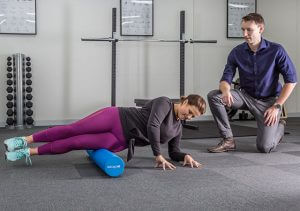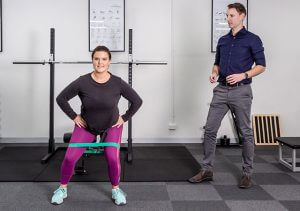Femoroacetabular Impingement, or FAI, has gained attention in both the sports and fitness fields in recent years, sparking debates over diagnosis and treatment. Recognised as a leading cause of hip and groin pain in athletes and active individuals alike, understanding FAI and its management is crucial. In this blog, one of our hip pain Physiotherapists answers some frequently asked questions about FAI.
What is Femoroacetabular impingement (FAI)? –
FAI, also known as hip impingement, occurs when the ball and socket-shaped hip joint pinches the surrounding soft tissues – namely the cartilage and/or labrum. This can result in pain to the hip or groin, or reduced mobility often exacerbated by specific movements and positions
What are the symptoms of FAI? –
Symptoms of FAI consist primarily of pain to the front of the hip or groin, along with stiffness or a lack of flexibility. Other symptoms may also include clicking, catching or locking. Pain may also radiate to the buttock or thigh. The symptoms of FAI often get worse with specific movements or exercise, but can also be exacerbated by sitting or standing for too long.
Why do people get FAI? –
Research suggests that structural abnormalities in the hip joint may predispose people to FAI, with some sports (most commonly AFL or soccer) and occupational activities (working or exercise) increasing the risk of symptoms. Repetitive movements such as deep squatting, prolonged sitting or standing, and specific sporting activities are associated with higher rates of FAI
How is FAI diagnosed? –
Understanding the movements that aggravate your symptoms, along with an assessment of your hip range of movement is often enough to diagnose FAI. However your health professional may send you for an X-Ray to understand the shape of your hip joint. An MRI may provide further information, such as the presence of a labral tear within the hip joint, but this is not always necessary for a diagnosis.
Can my hip pain be relieved? –
Yes, research has shown that an exercise program including hip & core strengthening exercises, good advice around which movements and activities to manage or avoid, along with balance and cardiovascular exercise can be a good way to reduce the symptoms of FAI. Whilst massage to specific muscles that act on the hip joint can relieve tension and increase hip movement.
Depending on the sporting or work tasks, some people may fail physiotherapy treatment, in which case a consultation with an orthopaedic surgeon, who specialises in hip arthroscopic surgery, may be required.
When is surgery considered for FAI? –
While many individuals with FAI can recover fully without surgery, particularly if they seek expert guidance from a Physio, those who can’t find relief may require consultation with an orthopedic surgeon specializing in hip arthroscopic surgery. Surgery is typically recommended for individuals with persistent symptoms, or those suffering from significant impingement that affects their ability to perform their work or to live an active life.
Can labral tears heal without surgery? –
Despite the presence of a labral tear, many individuals can recover from pain and regain full function without surgery. Research has shown that not all labral tears cause symptoms, highlighting the importance of a comprehensive assessment and individualised treatment approach.
What can I do to treat my own hip? –
This may sound obvious, but the number one thing you can do to relieve your hip pain is to stop aggravating your hip. This means avoiding activities that exacerbate hip impingement such as those movements involving extreme hip flexion. In the gym this may include deep squats, lunges or leg presses, certain yoga poses, and at work this may include deep squatting activities, or activities kneeling on the ground.
If you play high-impact sports, particularly those that combine quick change of direction movements with kicking, such as football, soccer and gymnastics, then you may need an extended period of time off.
If you’re still keen to squat, you can do so by limiting the depth to which you squat by placing a chair or bench behind you to prevent you squatting any lower than the bench (IMAGE).
Prolonged sitting can also irritate the hip, however, changing the angle of your hip by placing a thick pillow under your bottom, keeping your knees apart, and leaning back from time to time will help. As will setting a timer at your desk to get up and walk around for a few seconds, every 20 minutes or so.
Will massaging my hip help relieve pain? –
Yes! Often with hip impingement, the muscles of the hip and thigh get tight, which can further exacerbate pain and stiffness. Massaging these muscles by lying on a foam roller can really help, or even massaging yourself with your hands, or using a spikey ball or a massage gun.
As your muscles get looser, adding in some gentle hip mobility exercises or stretches may also help. But just remember, sometimes these movements can be aggravating because they can put your hip in an impingement position. Start gently and don’t push into the movement too hard, or too quickly.
Are there strength exercises that I can do to help hip impingement? –
Strengthening the muscles surrounding the hip, as well as the core, is absolutely crucial to alleviate hip pain in the long term. A program consisting of exercises to strengthen the hip extensors, adductors, abductors, external rotators and flexors, that respects the hip and avoids impingement positions, can help stabilise the hip joint, improve hip biomechanics, and alleviate pain. You can definitely try this yourself, but a Physio who specializes in treating FAI to create the program for you, and help you progress it will turbocharge your results
In summary, while femoroacetabular impingement (FAI) can present challenges, there are numerous strategies you can employ to overcome hip pain such as reducing aggravating activities, getting onto a foam roller and committing to a comprehensive hip strengthening program. With the right approach and determination, it’s entirely possible to overcome FAI, return to an active, pain-free lifestyle. and get back to doing the things you love.
LEARN MORE quick tips to overcome hip and groin pain caused by excessive sitting when working from home in this blog.
If you’re still struggling to get on top of your pain, our Physiotherapists are experts in treating hip pain. Call (03) 97522368 or BOOK ONLINE and get a treatment plan to overcome your hip pain today.



